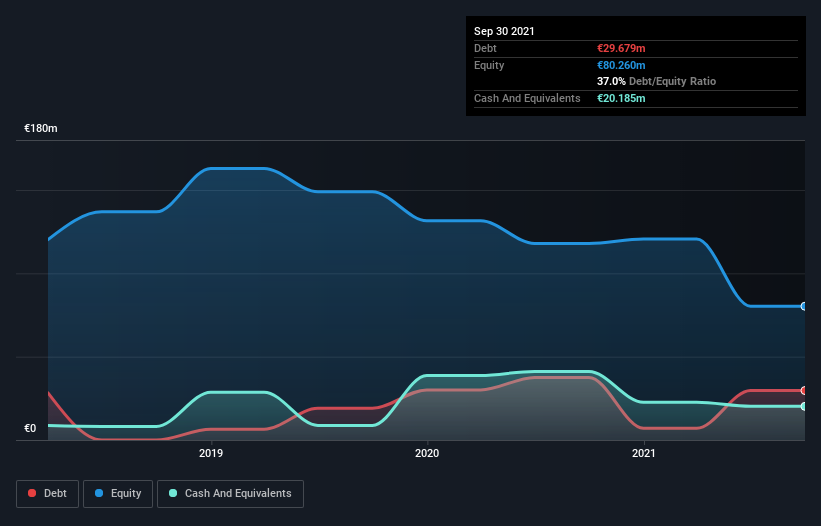
Warren Buffett famously said, 'Volatility is far from synonymous with risk.' When we think about how risky a company is, we always like to look at its use of debt, since debt overload can lead to ruin. We note that Klingelnberg AG (VTX:KLIN) does have debt on its balance sheet. But the more important question is: how much risk is that debt creating?
When Is Debt Dangerous?
Debt assists a business until the business has trouble paying it off, either with new capital or with free cash flow. Ultimately, if the company can't fulfill its legal obligations to repay debt, shareholders could walk away with nothing. While that is not too common, we often do see indebted companies permanently diluting shareholders because lenders force them to raise capital at a distressed price. Of course, debt can be an important tool in businesses, particularly capital heavy businesses. The first thing to do when considering how much debt a business uses is to look at its cash and debt together.
See our latest analysis for Klingelnberg
What Is Klingelnberg's Debt?
The image below, which you can click on for greater detail, shows that Klingelnberg had debt of €29.7m at the end of September 2021, a reduction from €37.5m over a year. However, it does have €20.2m in cash offsetting this, leading to net debt of about €9.49m.

How Strong Is Klingelnberg's Balance Sheet?
We can see from the most recent balance sheet that Klingelnberg had liabilities of €126.6m falling due within a year, and liabilities of €17.6m due beyond that. Offsetting these obligations, it had cash of €20.2m as well as receivables valued at €34.5m due within 12 months. So its liabilities outweigh the sum of its cash and (near-term) receivables by €89.5m.
This deficit is considerable relative to its market capitalization of €137.9m, so it does suggest shareholders should keep an eye on Klingelnberg's use of debt. This suggests shareholders would be heavily diluted if the company needed to shore up its balance sheet in a hurry. The balance sheet is clearly the area to focus on when you are analysing debt. But it is future earnings, more than anything, that will determine Klingelnberg's ability to maintain a healthy balance sheet going forward. So if you're focused on the future you can check out this free report showing analyst profit forecasts.
Over 12 months, Klingelnberg made a loss at the EBIT level, and saw its revenue drop to €152m, which is a fall of 18%. That's not what we would hope to see.
Caveat Emptor
Not only did Klingelnberg's revenue slip over the last twelve months, but it also produced negative earnings before interest and tax (EBIT). Indeed, it lost a very considerable €50m at the EBIT level. Considering that alongside the liabilities mentioned above does not give us much confidence that company should be using so much debt. So we think its balance sheet is a little strained, though not beyond repair. Another cause for caution is that is bled €15m in negative free cash flow over the last twelve months. So in short it's a really risky stock. The balance sheet is clearly the area to focus on when you are analysing debt. However, not all investment risk resides within the balance sheet - far from it. Be aware that Klingelnberg is showing 1 warning sign in our investment analysis , you should know about...
If you're interested in investing in businesses that can grow profits without the burden of debt, then check out this free list of growing businesses that have net cash on the balance sheet.
If you're looking to trade Klingelnberg, open an account with the lowest-cost platform trusted by professionals, Interactive Brokers.
With clients in over 200 countries and territories, and access to 160 markets, IBKR lets you trade stocks, options, futures, forex, bonds and funds from a single integrated account.
Enjoy no hidden fees, no account minimums, and FX conversion rates as low as 0.03%, far better than what most brokers offer.
Sponsored ContentValuation is complex, but we're here to simplify it.
Discover if Klingelnberg might be undervalued or overvalued with our detailed analysis, featuring fair value estimates, potential risks, dividends, insider trades, and its financial condition.
Access Free AnalysisHave feedback on this article? Concerned about the content? Get in touch with us directly. Alternatively, email editorial-team (at) simplywallst.com.
This article by Simply Wall St is general in nature. We provide commentary based on historical data and analyst forecasts only using an unbiased methodology and our articles are not intended to be financial advice. It does not constitute a recommendation to buy or sell any stock, and does not take account of your objectives, or your financial situation. We aim to bring you long-term focused analysis driven by fundamental data. Note that our analysis may not factor in the latest price-sensitive company announcements or qualitative material. Simply Wall St has no position in any stocks mentioned.
About SWX:KLIN
Klingelnberg
Develops, manufactures, and sells machines for bevel and cylindrical gear machining, and measuring centers for axially symmetrical objects and gears worldwide.
Undervalued with adequate balance sheet.
Market Insights
Community Narratives



